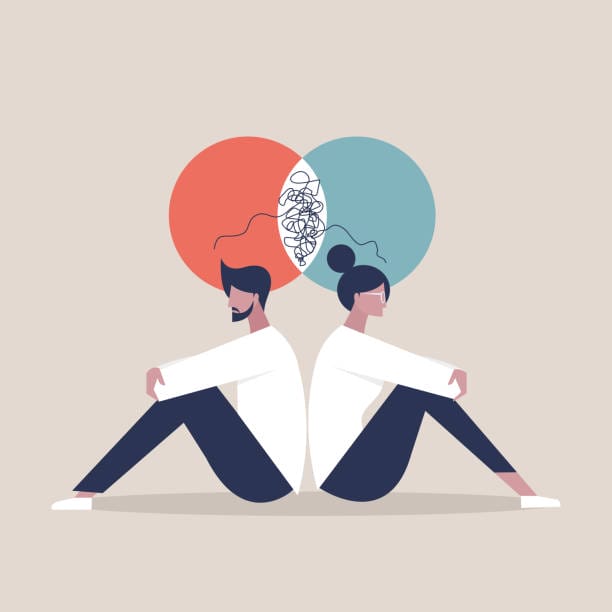
Historically, people have an abundance of opinions about masturbation. Evidence indicates that the benefits of cisgender female masturbation, when practiced healthily, are abundant, both sexual and emotional. However, there is still a societal stigma surrounding the practice. This stigma is particularly present when discussing cisgender female masturbation. One reason there might still be a stigma surrounding cisgender female masturbation is what certain people consider a sexual double standard. One such narrative that falls within the double standard is that men’s sexuality is “typical” and women’s sexuality is “scandalous.” For some, masturbation can be a regular aspect of sexual discovery and expression. However, some of the sexual scripts portrayed for women instill guilt in women from a young age. These sexual scripts may be why the rates of masturbation amongst females are significantly lower than those of men. But the truth is, there is nothing wrong with masturbation. Even if you’re a woman constantly being told that your sexuality is devious, there are many benefits of cisgender female masturbation.
Why is Cisgender Female Masturbation So Controversial? 
Given the narratives discussed above about cisgender male masturbation as “typical,” a phenomenon that occurs where many people know and accept cisgender male masturbation. Conversely, when considering cisgender female masturbation is considered illicit and inappropriate. Female sexuality has been suppressed for ages, mainly stemming from a trend that views women’s bodies for procreation, with little attention given to their bodies for pleasure.
One sexuality script that stems from gendered sexuality is the attribution of initiation and pleasure-seeking to men, whilst women are thought to have passive or gate-keeping roles for sexual behavior. Though we have made great strides, there is still dominant rhetoric that we expect men to be sexual beings whilst others are being devious for practicing the same sexual habits. A study of adolescent girls even indicated that a considerable number of girls hold negative views of both masturbation itself and of other girls who engage in masturbation. Another study of college students had the majority of the women in the study report still struggling with the contradiction between societal stigma and physical pleasure, whilst the men in this study rarely indicated this same sentiment. And both male and female participants in this study cited differential sexual scripts as the main contributor to the double standard viewing male-bodied masturbation as typical and cisgender female masturbation as sexually devious.
Masturbation leading to harmful sexual adjustment has no basis, and plenty of women practice self-stimulation. The famous Alfred Kinsey studies on human sexuality showed that over half of the women who participated in the study masturbated to orgasm at least once, and that was over seventy years ago. A more recent study indicated that approximately 89% of women have masturbated at least once in their lives, with 27% of women reporting that they regularly masturbate two to three times a week. Normalization, education, and open discussions can help reduce and even eliminate this negative stigma once and for all, with more empowered people normalizing self-love, regardless of their genitals or gender identity. Though there are many benefits of cisgender female masturbation, it is important to remember that there is a lot of shame culture surrounding masturbation, specifically cisgender female masturbation, both from external sources and internally within the Self. There is nothing wrong with feeling shame toward masturbation, but there are ways to help lessen this feeling. Much of this shame is externally driven, often influenced by common misconceptions surrounding masturbation.
Isn’t Masturbation Bad for Me?
Below we will discuss common concerns people hold about masturbation.
Masturbation will hurt my genitals.
Sexual engagement is a natural function of the human body, so the body parts used to do so are sturdy. You may encounter discomfort because of overuse and/or vigorous rubbing, but that is easily fixed with lubricants. There are some cases in which masturbation may cause pain. For example, for those with micro-perforated hymens, penetrative masturbation is virtually impossible without undergoing a hymenectomy. Many other genital diagnoses fall under Genio-Pelvic/Penetrative Pain Disorder (GPPPD) that are beyond the scope of this article, but I encourage you to look into it if you think you might have this disorder. If you do encounter physical discomfort or pain during masturbation, or any sexual activity for that matter, consider contacting a medical professional if the issue persists or increases in severity. We recommend going to a pelvic floor specialist (Pelvic Floor Physical Therapist or an OB/GYN who is specially trained in the pelvic floor).
Masturbation leads to mental health issues.
There are certainly specific instances in which engaging in masturbation can lead to mental or emotional distress, and these cannot be made light of. Many individuals are asexual, experiencing little to no sexual attraction or desire. Even if you may not label yourself as asexual, it is perfectly fine not to desire to masturbate. Therefore, participating in masturbation when a person has no desire to, may cause distress. Those who are survivors of sexual assaults may experience unwanted triggers during sexual stimulation, even when it is self-induced. People raised in particularly religious households may hold great senses of guilt regarding masturbation, causing the practice to be stressful for them. These are just a few of the vast myriad of reasons why masturbation could lead to mental stress. However, these are extenuating circumstances. The practice of masturbation alone does not increase distress among individuals. It is important to be in touch with yourself and the way you feel regarding masturbation, or any sexual practice for that matter, but do not let this belief stop you from exploring your sexuality.
Masturbation will tire me out sexually.
You might not feel as much of a need to have sex after masturbation, but there is no maximum level of sex drive one person can experience in their lifetime. You will not necessarily experience sexual burnout due to masturbation. According to the Kinsey Institute, cisgender female orgasms tend to be longer in duration than those of cisgender men, and cisgender female people may experience multiple orgasms in a row within a short time, something that is fairly rare amongst male-bodied individuals. Though masturbation can lead to issues with sexual performance with partners, this is more common amongst individuals who experience some level of porn-addictions or masturbation techniques that are not conducive to reaching their partnered sexual goals. Typically speaking, you will not experience lowered sex drive or burnout from masturbating.
If I’m in a relationship, masturbation is cheating.
You may have a partner who does view masturbation as cheating since it is a sexual act not involving them. If you choose to respect your partner’s comfort level, that is well within your rights. However, every human being has a right to self-love, and masturbation usually helps with improving one’s sex life. So if your partner is uncomfortable with you masturbating, but it is still something you’d like to do, the key is honesty and communication with your partner. Make sure you both discuss and set boundaries relating not only to masturbation but to sexual relations in general. In many cases, masturbation can bring you closer to your partner, acting as an outlet if they are not as sexually driven as you and being a safe space for you to explore your sexual fantasies before trying them out with a partner.
Are There Any Health Benefits of Cisgender Female Masturbation?
There are many physical and emotional benefits of cisgender female masturbation when done intentionally and healthily. See below for details.
Benefits of Cisgender Female Masturbation to Orgasm

Regulation of hormones
The hormones released during orgasm (oxytocin and nitric oxide) are important players in your body’s hormone regulation, preserving regular ovulation cycles and repairing adrenal fatigue. Plus, if you are pregnant or breastfeeding, prolactin (a hormone released by the anterior pituitary gland that stimulates breast development and milk production) increases immediately following orgasms.
Improving circulation
As the body becomes aroused and as it stays in an arousal state during masturbation, there is increased blood flow. Genitals become engorged with blood. Women experience a “flush” in their cheeks. Through its stimulation of muscular contractions and the accompanying increase in blood flow, orgasms regulate the functionality of the genital tract as well.
Meaningful aids for calmness
Becoming aroused and staying in an arousal state has many calming effects on the body. When you are aroused, your heart rate tends to increase and endorphins, adrenaline, and dopamine all get released. Your eyes tend to dilate and you have increased blood flow. Some people experience a release of oxytocin before orgasm but certainly during and after. All of these neurochemicals are helpful in getting you into a relaxed state. For some people, being aroused also has a meditative like effect on them where they are hyper focused and “in the zone” so to speak. This focus allows them to let go of the outside world and can be considered a mindfulness practice.
Immunity support and stimulating both the reproductive and lymphatic systems
During arousal, pain tolerance increases, this is especially true for women. For women who are not on birth control, there is a potential for testosterone levels to increase during arousal. Testosterone has been shown to help with bone mass, mood, and cognitive functioning as they relate to staying healthy. Additionally, arousal and achieving orgasms regularly can escalate your body’s infection defense cells by up to 20% in the lymphatic system. Orgasms activate your hypothalamus gland. This gland is crucial in keeping your reproductive and lymphatic systems healthy, regulating digestion, and detoxifying.
Benefits of Cisgender Female Masturbation without Orgasm

Boosts in Estrogen and Dopamine
Increased estrogen production from masturbation preserves your bones, heart, and vaginal tissue. And, since masturbation is an activity for pleasure, dopamine levels, your body’s main satisfaction neurotransmitter, elevate. Arousal by itself increases dopamine levels. Additionally, orgasm releases more dopamine.
Improve sexual functioning
Masturbating regularly relieves sexual tension, helps you find out what you enjoy regarding sexual touch in a safe, non-judgmental space, improves confidence in sexual prowess, and can make it easier to achieve orgasm when with a partner. When we create a safer space to be sexual with ourselves, it subsequently helps us create safer spaces to be sexual with others.
Boosting self-esteem
Masturbation allows people to learn their sexual responses and pleasure preferences while fostering a sense of autonomy and bodily integrity. This can be particularly helpful for women since it can improve self-esteem and sense of identity. By focusing on building your self-esteem, it may be possible to shake some feelings of shame. Working through shame can be a long and emotionally arduous process. By easing yourself into masturbation and being very aware of how it makes you feel before, during, and after, you can begin adjusting and reframing your mindset. It won’t likely be an immediate payoff, but it could yield a lot of self-empowerment and reclamation of your sexuality down the road. Remember that masturbation is a different experience for everyone. Some people feel more satisfied from it than others, some people feel more shame from it than others, and no matter what your feelings toward masturbation are, your feelings are valid. Though pushing yourself out of your comfort zone can be helpful in many cases, it is important to stay in touch with your emotions and stay true to your boundaries.
How Can I Begin the Practice of Masturbation?
To properly reap the benefits of cisgender female masturbation, you must learn how to masturbate correctly. The good news is “proper” masturbation techniques are unique to each individual. If you’ve never masturbated before, don’t fret. You don’t need anything besides your fingers, but if you want to use a prop, you can! Try a singular session with yourself to test the waters. Find a safe, comfortable place where you feel at ease. Take a few minutes to calm down, so you feel relaxed. Spend 15-20 minutes exploring your body and seeing what feels good. If it feels particularly good, keep doing it. If your first time around goes well, or even not terribly, consider trying to masturbate for 15-20 minutes twice a week. If it feels like too few, maybe try three or four times a week. If it feels like too many, maybe try just once a week. You have ample time to explore what works for you. Take it at your own pace.
How Can I Develop Healthy and Empowering Masturbation Habits?
Only masturbate when you WANT to.
Do not feel like it’s something that you must do just to keep your sexual health stable. If it feels like an activity you engage in just to check a box, you may need to change your strategies and frequency. Or maybe masturbation is just not for you. Ultimately, masturbation should be something that is pleasurable to you and feels fulfilling.
Be honest and in touch with your body.
If something feels emotionally or physically uncomfortable, that is your cue to stop. Remember, not all masturbation techniques will work well for you, and there’s nothing wrong with trying something and deciding it isn’t for you. You may want to explore what was uncomfortable for you. Was it an emotional discomfort? If so, what was coming up for you that felt uncomfortable? Where do you think that came from? How are you understanding it? Was it a physical discomfort? If so, what was uncomfortable? How would you describe the discomfort? Was it long-lasting or did it stop once you stopped masturbating? By exploring the discomfort, you may be able to overcome the discomfort. Exploration is a good tool for getting to know yourself.
Make a habit of calming yourself before AND after.
Getting yourself in the right state of mind before you masturbate can be helpful to the outcome. If you come into your masturbation experience in a bad mental state, chances are you won’t get out of the experience what you want (pleasure, relaxation, etc.). Feeling relaxed before you start masturbating and allowing yourself to decompress immediately afterward will allow your body and mind to digest the experience. Aftercare is not just for sex with partners. Making sure you process and explore your experience is important.
Use lubrication
Though some cisgender women can experience the self-lubrication of their vulva, this isn’t always enough. Using lubrication can diminish friction and save you from irritability.
What Sorts of Techniques Can I Use to Increase my Satisfaction?

Know what it means to be satisfied for you
Everybody is different, and so is everybody’s definition of sexual satisfaction. Keep in mind that orgasm, while often enjoyable, should not necessarily be the end goal of masturbation. Just because you reach orgasm does not necessarily indicate that you were fully fulfilled, and if you didn’t orgasm doesn’t mean you didn’t enjoy yourself. Your satisfaction is defined by you and you alone. What do you find satisfying? What do you want present in your masturbation experience? What do you want absent from this experience?
Try out different strategies
You may want to introduce sex toys, such as vibrators for clitoral stimulation or dildos for penetrative stimulation. Switch up your body positioning. Try longer sessions with slower buildup. As stated above, explore your body, and see what you like. To enhance satisfaction, exaggerate what you learned in your exploration. Different methods can cause entirely different feelings of pleasure.
Pay attention to the following: pressure, placement, motion, and speed. That is, when you touch yourself are you hard or soft with your touch? Where on your body feels the most pleasurable? Does this place on your body move each time you masturbate or stay the same? Are you more clitoral or g-spot oriented? What type of motion do you use- circular, tapping, up and down? Are you quick with your touch, or do you like it more slow and sensual? Paying attention to these strategies will help you the next time you masturbate and describe what you like with a partner if you want.
Masturbate to erotica
Watching pornography while masturbating is quite a common strategy. But if porn isn’t your thing, there are many other options. Try writing out your sexual fantasies and reading them or playing them in your mind while you masturbate or find erotic literature or audio so you can be stimulated aurally and still have two hands-free to stimulate physically.
Synchronize your masturbation schedule to your menstrual cycle
You can take advantage of your body’s natural shifts in hormones, such as estrogen and testosterone. These hormones are more present during your ovulation phase, so masturbating during this time can feel even better simply because of what’s going on in your body at that time.
Stimulate other areas of your body first
Create your foreplay by stimulating your secondary erogenous zones before going straight to your primary erogenous zones. Lightly run your hands over your inner thighs, upper chest, and abdomen to raise arousal before you start with direct stimulation.
Stimulate multiple areas at once
One of the advantages of having your hands free during masturbation is stimulating yourself in multiple places simultaneously. Your clitoris, the inside of your vaginal wall, your anus, and your nipples can be good sources of pleasure. Trying out the different combinations of where you touch yourself and how can be immensely rewarding.
Try it out with a partner
If you have a willing sexual partner, try involving them in your masturbation practices. Involving a partner can be as simple as telling them when you’re touching yourself or even trying mutual masturbation, where both of you are self-pleasuring in the same space while watching each other. Incorporating partner involvement is a fun way to empower your self-pleasure practice and grow closer to your partner in an intimate sense.
To debrief…
Though there is certainly a stigma surrounding cisgender female masturbation, the idea of this article is to help you shed shame if you have it about learning to please yourself. Sexologists recommend masturbation as a means for women to learn about their bodies and sexual preferences as it can improve their body image and familiarity with their genitalia. It is not just for cis men. Many times, sex therapists will use masturbation as a tool as a means to work through difficulties their clients may be experiencing either with their actual sexual experiences or with their perspectives on their sexuality. Masturbation is for anyone and everyone able and willing to participate! There is no right or wrong way to masturbate or not masturbate. It is entirely up to you. The benefits of cisgender female masturbation are abundant, but it is your decision how (and whether or not) you would like to pursue them.
If you found this article helpful or if you are looking to gain clarity and explore your masturbation, call us to collaborate with therapists that specialize in sex and sexuality. 267-495-4951.
Meet The Author:

Keeghan McLane
Clinical Mental Health Counselor Intern
Keeghan McLane, a Clinical Mental Health Counselor Intern, is dedicated to normalizing therapy and reducing mental health stigma. Based in Philadelphia, they focus on serving a diverse client base, with a special interest in the LGBTQIA+ community. Keeghan employs Cognitive Behavioral Therapy and values building a strong, trusting counselor-client relationship. They hold a bachelor's degree in psychology from Temple University, graduating cum laude, and are currently pursuing a master's in clinical mental health counseling at Villanova University. Keeghan's future goals include becoming a Licensed Professional Counselor in Pennsylvania and a certified sex therapist, supported by their background in Gender, Sexuality, and Women's Studies.
Learn more about Keeghan McLane ⇒









